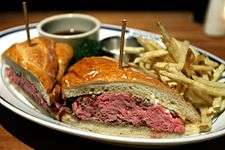Bacon sandwich
A bacon sandwich (also known in parts of the United Kingdom and New Zealand as a bacon butty, bacon bap or bacon sarnie, in Ireland as a rasher sandwich[1] and as a bacon sanger in Australia) is a sandwich of cooked bacon between bread that is optionally spread with butter, and may be seasoned with ketchup or brown sauce. It is generally served hot. In some establishments the sandwich will be made from bread toasted on only one side, while other establishments serve it on the same roll as is used for hamburgers.
 A bacon sandwich | |
| Alternative names | Bacon butty, bacon sarnie, rasher sandwich, bacon sanger, piece 'n bacon, bacon cob, bacon barm, bacon muffin |
|---|---|
| Type | Sandwich |
| Place of origin | United Kingdom |
| Serving temperature | Hot |
| Main ingredients | Bread and bacon, with a condiment, often ketchup or brown sauce |
| Variations | BLT |
Bacon sandwiches are an all-day favourite throughout the United Kingdom.[2] They are often served in British cafes, and are anecdotally recommended as a hangover cure.[3]
Variants
The New York Times-London Journal reported on a study conducted at Leeds University which consisted of testing 700 variants of the sandwich. They experimented with different cooking styles, types of bacon, breads, oils, and special additions. Each variant was then ranked by 50 tasters. In conclusion, the best bacon sandwiches are made with "crispy, fried, and not-too-fat bacon between thick slices of white bread." [4]
Another study by the Direct Line for Business listed the top additions to the traditional bacon butty in England. Although the original was still the preferred sandwich, the next top contender was the "breggy" which adds an egg. The next popular accessory was mushrooms, followed by cheese. For sauces, brown sauce was slightly favoured over ketchup.
The BLT is a popular variant of the bacon sandwich with the additional ingredients of lettuce and tomato, but served cold.[5]
In Canada, Peameal bacon § Sandwiches are a common variation, and are even considered the unofficial dish of Toronto[6].
Health concerns
Numerous studies have showed a connection between processed meats and an increased risk of serious health conditions such as type 2 diabetes, various cancers, and cardiovascular disease.[7]
A study in 2007 conducted by the World Cancer Research Fund found that there was "convincing evidence" of a link between processed meats and an increased chance of cancer. Although no numerical value was provided for the risk, they did state that "people should not eat more than 500g of red meat a week." [8]
The World Health Organization released a warning concerning the sodium content in bacon. For 100g of bacon, there are approximately 1,500 mg of sodium.[9] Currently, the FDA reports that the average American adult should consume less than 2,300 mg per day. Too much sodium in ones diet can lead to a higher probability of high blood pressure, which is a major cause of heart disease and stroke.[10]

See also
References
- Blog, Tog (October 2009). "The Rasher sandwich..." Togblog. Retrieved 2 September 2012.
- Cloake, Felicity (7 March 2012). "How to cook the perfect bacon sandwich". The Guardian. Retrieved 15 January 2015.
- "Bacon sandwich really does cure a hangover". The Daily Telegraph. 7 April 2009. Archived from the original on 7 January 2010. Retrieved 29 April 2013.
- Cowell, Alan (11 April 2007). "The Perfect Bacon Sandwich Decoded: Crisp and Crunchy". The New York Times. ISSN 0362-4331. Retrieved 23 April 2020.
- Olver, Lynne (20 March 2015). "Food Timeline FAQs: sandwiches". FoodTimeline. Retrieved 12 September 2017.
- Raskin, Robbie. "Regional Foods: Toronto's Peameal Bacon Sandwich | Stadium Journey". Retrieved 10 June 2020.
- Rohrmann, Sabine; Linseisen, Jakob (August 2016). "Processed meat: the real villain?". Proceedings of the Nutrition Society. 75 (3): 233–241. doi:10.1017/S0029665115004255. ISSN 0029-6651.
- Spiegelhalter, David; Riesch, Hauke (2008). "Bacon sandwiches and middle – class drinkers: the risk of communicating risk". Significance. 5 (1): 30–33. doi:10.1111/j.1740-9713.2008.00277.x. ISSN 1740-9713.
- "WHO issues new guidance on dietary salt and potassium". www.who.int. Retrieved 23 April 2020.
- Nutrition, Center for Food Safety and Applied (2 April 2020). "Sodium in Your Diet". FDA.
External links
- "Scientists 'perfect' bacon butty: Scientists have created a mathematical formula of how to make the perfect bacon butty". BBC. British Broadcasting Corporation. 9 April 2007.
.jpg)

